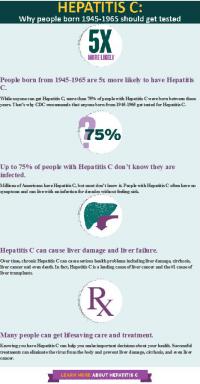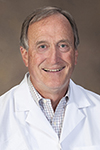
 The baby boomer generation, those born between 1945 through 1965, have left a lasting imprint on American culture and now, as they move toward their golden years, a silent killer may be ravaging the health and well-being of many people in this age group.
The baby boomer generation, those born between 1945 through 1965, have left a lasting imprint on American culture and now, as they move toward their golden years, a silent killer may be ravaging the health and well-being of many people in this age group.
People born from 1945-1965 are five times more likely to have hepatitis C, a virus that over time, can cause serious health problems, including liver damage, cirrhosis, liver cancer, liver transplantation and even death – and most people don’t know they are infected. Because of the risk of being a hepatitis C carrier, the U.S. Centers for Disease Control and Prevention (CDC) has recommended that all people in this age group be screened for the virus.
The only way to know if someone has hepatitis C is for the individual to be tested. Now, thanks to a free walk-in clinic at the University of Arizona Health Network’s Liver Research Institute, free screening for Hepatitis C is available.
 The clinic, which also offers treatment and lifetime care, is located at the University of Arizona Medical Center – University Campus, 1501 N. Campbell Ave. Information regarding a walk-in screenings are available at 520-621-HEPC (4372). The clinic opens its doors on July 18; effective July 10, the hotline information number began accepting calls. The clinic is open Friday mornings from 8-11 a.m. and is located on the sixth-floor multi-specialty outpatient clinic. Minimal registration is involved.
The clinic, which also offers treatment and lifetime care, is located at the University of Arizona Medical Center – University Campus, 1501 N. Campbell Ave. Information regarding a walk-in screenings are available at 520-621-HEPC (4372). The clinic opens its doors on July 18; effective July 10, the hotline information number began accepting calls. The clinic is open Friday mornings from 8-11 a.m. and is located on the sixth-floor multi-specialty outpatient clinic. Minimal registration is involved.
Currently, the Arizona Department of Health Services does not offer free, state-funded hepatitis screening. The Liver Institute is the only local free clinic for hepatitis C screening at this time.
 Thomas D. Boyer, MD, the Robert S. and Irene P. Flinn Professor of Medicine, director of the Liver Institute, and head of the University of Arizona Department of Medicine, said, “People with hepatitis C often have no symptoms, can live with an infection for decades without feeling sick, and more importantly, successfully can be treated and cured with medications.”
Thomas D. Boyer, MD, the Robert S. and Irene P. Flinn Professor of Medicine, director of the Liver Institute, and head of the University of Arizona Department of Medicine, said, “People with hepatitis C often have no symptoms, can live with an infection for decades without feeling sick, and more importantly, successfully can be treated and cured with medications.”
Carol Peters, ANP, said the new treatment for hepatitis C is oral-based, versus injection, and the treatment time is shorter and more effective, with minimal side effects.
The screening test itself takes about 20 minutes and is 98 percent accurate. Any patients testing positive will need to follow up for confirmatory testing.
Media Contact: Rebecca Ruiz Hudman

